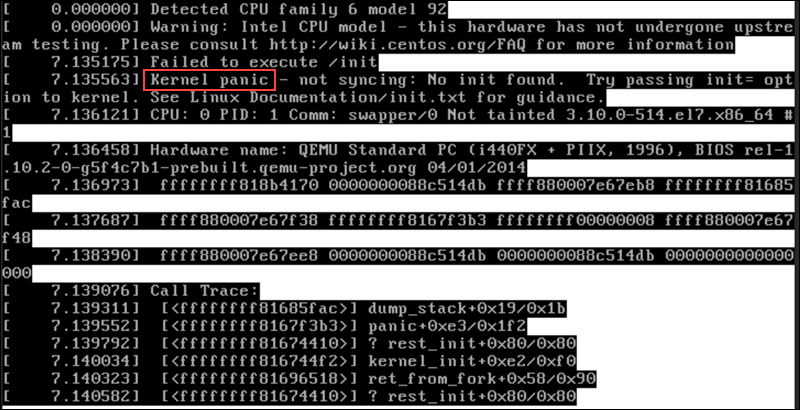Kernel Panic
A kernel panic occurs when a mac operating system (OS) cannot quickly or easily recover. It occurs when there is a low-level fatal error and the operating system’s kernel is unable to fix it.
A kernel panic error stops the system to prevent corruption of the system’s software, hardware or memory. It helps preserve data and allows technicians to run a debugger to determine the problem.In addition, kernel panic prevents further damage to software, hardware, and memory after a major system error. It stores a dump which can be use to determine the problem. In a kernel panic state, the OS displays different messages, including the type of error, the code module running when the error occurred, and the drives loaded.
Right is an example of a kernel panic in macOS:
In most cases, kernel panics are resolved by rebooting the system, either manually or automatically.
The difference between a kernel panic and a system crash
In spite of the fact that a kernel panic and a system crash both indicate abnormal states of a system, and both may pose severe issues for the user, they refer to different aspects of failure of the system.
It occurs when the kernel, the core component responsible for managing system resources, encounters an error and terminates abnormally in Unix-based systems. When a kernel panic occurs, all system processes are stopped and a diagnostic message is displayed.

Kernel panic is usually caused by critical errors such as hardware failures, severe software bugs, or faulty device drivers, and is often accompanied by a “panic” sound or distinctive visual pattern.
When a kernel terminates software (an app or the OS) that encounters an error that prevents it from functioning properly, a system crash occurs, also called a system failure. As a result of the error, the entire system usually becomes unresponsive or shuts down abruptly.
Kernel panic causes
Kernel panic is caused by multiple scenarios and factors. The most common causes are listed below.
Memory or RAM can malfunction, causing kernel panics. Modern operating systems, such as Mac OS X, are sensitive to memory. Kernel Panics may occur when third-party kernel extensions that is software not written by Apple or dependencies that are incompatible with the version of Mac OS X you are using. When the kernel attempts to load or execute corrupt kernel extensions or dependencies, such as those caused by hard disk corruption, kernel panics are likely to occur.
- Incompatible, obsolete, or corrupt drivers. Similar to kernel extensions, third-party drivers that are incompatible with your version of Mac OS X, or that have become corrupt, will cause kernel panics.
- Corruption of hard disks, including bad sectors, directory corruption, and other problems.
- System-related files or folders with incorrect permissions.
- Hard disk space and RAM are insufficient.
- Hardware or software that has been installed incorrectly
Computer Repairs
Slow computer and laptop Repairs.
Broken Screen Replacements.
CMOS Battery Replacement.
Laptop Repairs
Screen replacement
Laptop not booting
PC Repairs
windows updates problems.
network and print issues
windows not booting properly.
Computer Technician
update software packages,
diagnose and resolves IT issues.
setup email
Apple Mac Repair
Apple Mac Hard drive replacement
SSD drive replacement.
Damaged Screen.





